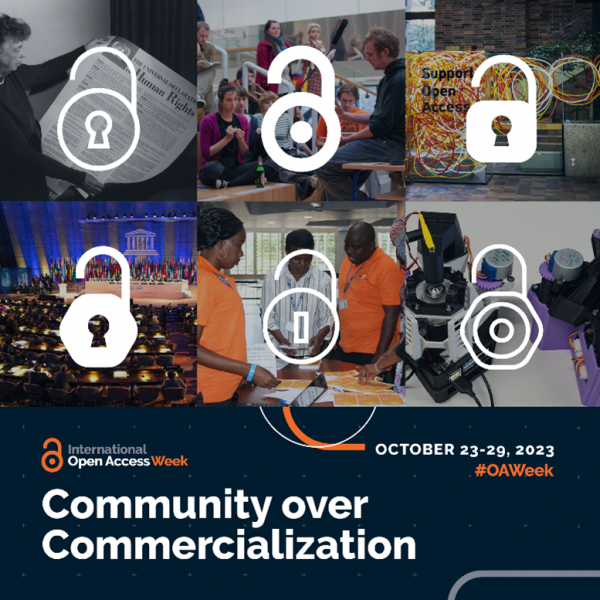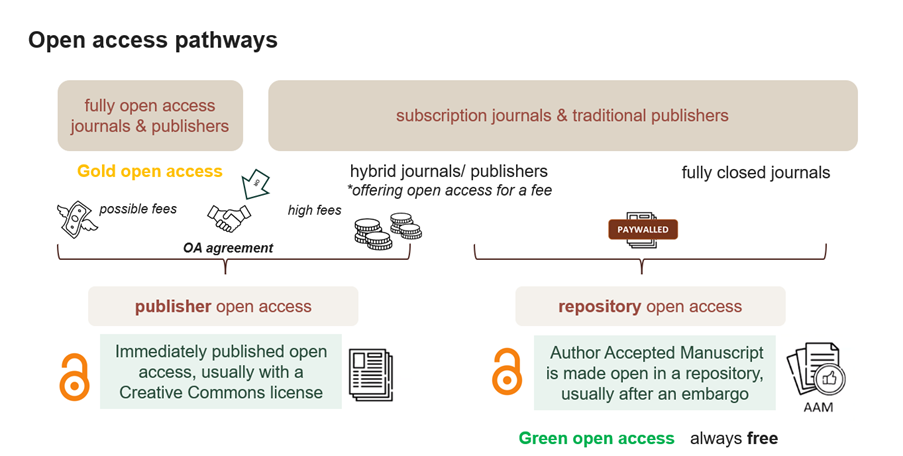
Come and Celebrate Open Access Week with your Library!
Open Access Week is here! This year’s theme is Community over Commercialization.
This week you can attend sessions from both the Library and the Australian and New Zealand Open Access community.
We start the week with our own Library staff talking about Open Educational Resources.
In Our Open Era
Monday 23 October 2023
11AM – 12PM AEDT
Kate Allman (CSU), Lauren Brumby (CSU)
Imagine a world with no publisher license agreements or access restrictions on teaching materials! Enter, Open Educational Resources (OER).
OER are online learning and teaching materials that are published either in the public domain or under Creative Commons licenses that allow them to be shared, adapted, modified and reused.
Join Charles Sturt Library staff for an introduction to OER and the growing possibilities connected to working with open textbooks.
https://events.humanitix.com/oer
Publishing your research: Open Access
Tuesday 24 October 2023
10AM – 11AM
CSU Librarians
In this workshop we’ll take an in depth look at everything Open Access. We’ll explain what Open Access is, the benefits of Open Access, how to make your work Open Access and also demonstrate tools you can use to identify reputable and relevant Open Access publishers.
Community over commercialisation – What is community control and why does it matter?
Tuesday 24 October 2023
11AM – 1PM AEDT
Fiona Bradley (UNSW), Ginny Barbour (OAA)
Different communities have different needs, aims and priorities about the knowledge they hold and create. There can be a tension between open access and community control of that knowledge. How do communities keep control of their knowledge while opening it to the world? How can open access be used to help build and strengthen communities?
This session looks at the ways communities openly share their knowledge. It also explores how sometimes community and commercial interests can coexist.
https://unsw.zoom.us/meeting/register/tZYtcOCprzMrH9z2eF-r5oD_VNCieW9_CMjV
Like an open book: can academic communities ensure our voices are heard by all?
Wednesday 25 October 2023
11AM – 1PM AEDT
David Groenewegen (LaTrobe)
Books are where we record our knowledge, for us and for others. However, books remain far less open than journal articles. Why is this? What opportunities are there for academic communities to improve access to our knowledge and culture? How can uniquely Australasian voices be heard?
In this session, we will hear from panellists working in different ways to improve access to books. In the second hour, participants will be given the chance to reflect on the discussion and share their thoughts.
https://unsw.zoom.us/meeting/register/tZ0tf-mgrjorGNQozOeJ_i29pnJwSoz0KFeV
Shine on Diamond journals: making sure they’re forever!
Thursday 26 October 2023
11AM – 1.30PM
Michelle Blake (Uni Waikato), Dimity Flanagan (UoM)
Diamond open access journals are an important but undervalued part of the open access journal publishing system. They often lack infrastructure, funding and coordination.
This workshop, which is being run as a satellite meeting as part of the Global Summit on Diamond Open Access being held in Mexico this week, will hear from those already involved in successful diamond OA initiatives, workshop what is needed for successful diamond OA journals, and develop a plan for necessary next steps in this region.
https://unsw.zoom.us/meeting/register/tZwpdeyprTkvHdaK-GbA9Syr9JTr4x0GvC_-
Creating space for Indigenous and Pacific research
Friday 27 October 2023
11AM – 1PM
Kim Tairi (UAT)
Part 1: Publishing avenues for Indigenous-led research
How do Indigenous academics share their research in a way that is meaningful to them and the communities they wish to serve? A number of Indigenous-led open access journals have been set up with the purpose of exploring Indigenous and Pacific issues and concerns, providing an opportunity to disseminate research. This session will explore the driving force behind the development of these journals, and the challenges in getting Indigenous research out into the scholarly community.
Part 2: Engagement with indigenous knowledge
How do Indigenous communities share their knowledge in a way that aligns with their community rules and protocols? How can we ensure Indigenous knowledge is treated respectfully when it is in the public domain? This session will explore some of the recent initiatives seeking to tackle these questions.
https://unsw.zoom.us/meeting/register/tZcoduyorj0vGdeIANKZploQCKkUcDqPOdTE
What is Open Access & why should you care?
Open access refers to the practice of providing unrestricted access to research outputs available online. These outputs can range from journal articles and conference papers to books and book chapters. For an output to be considered truly open access, it should not only be freely available but also be licensed, for example with a Creative Commons license, which permits further sharing and reuse.
In contrast to open access, closed publications are hidden behind paywalls, which means they can only be accessed by paying a fee or through a subscription. Many universities pay subscriptions to extensive databases of journals or ebooks. However, rising subscription costs render these resources out of reach for many institutions. Additionally, the individual access costs for a single journal article or book chapter typically range from 40 to 65 AUD, which makes accessing research prohibitively expensive for many students and researchers.
Pathways to Open Access Publishing
There are two key pathways to open access publishing – the publisher pathway and the repository pathway:

Image: Adapted from an original graphic under CC BY by University of Melbourne Library.
Publisher Open Access
You can publish your work as open access by paying an article processing charge (APC) directly to the publisher. This payment some sometimes be avoided if an open access agreement (formerly called Read and Publish Agreements) has been set up between Charles Sturt and the publisher. Currently, Charles Sturt has signed up to 7 different publisher agreements. To find out more visit the Library’s Open Access guide.
Repository Open Access
Repositories are another way of making your research output open access. The peer-reviewed Author Accepted Manuscript (AAM) can be made openly accessible in an institutional or subject repository. Often, an embargo of between 6 and 36 months will apply. The repository open access pathway is always free.
Are you interested in learning more?
Contact your School Librarian, read our Open Access library guide, or come along to the Open Access week activities.
Discover more from Charles Sturt University Library Blog
Subscribe to get the latest posts sent to your email.